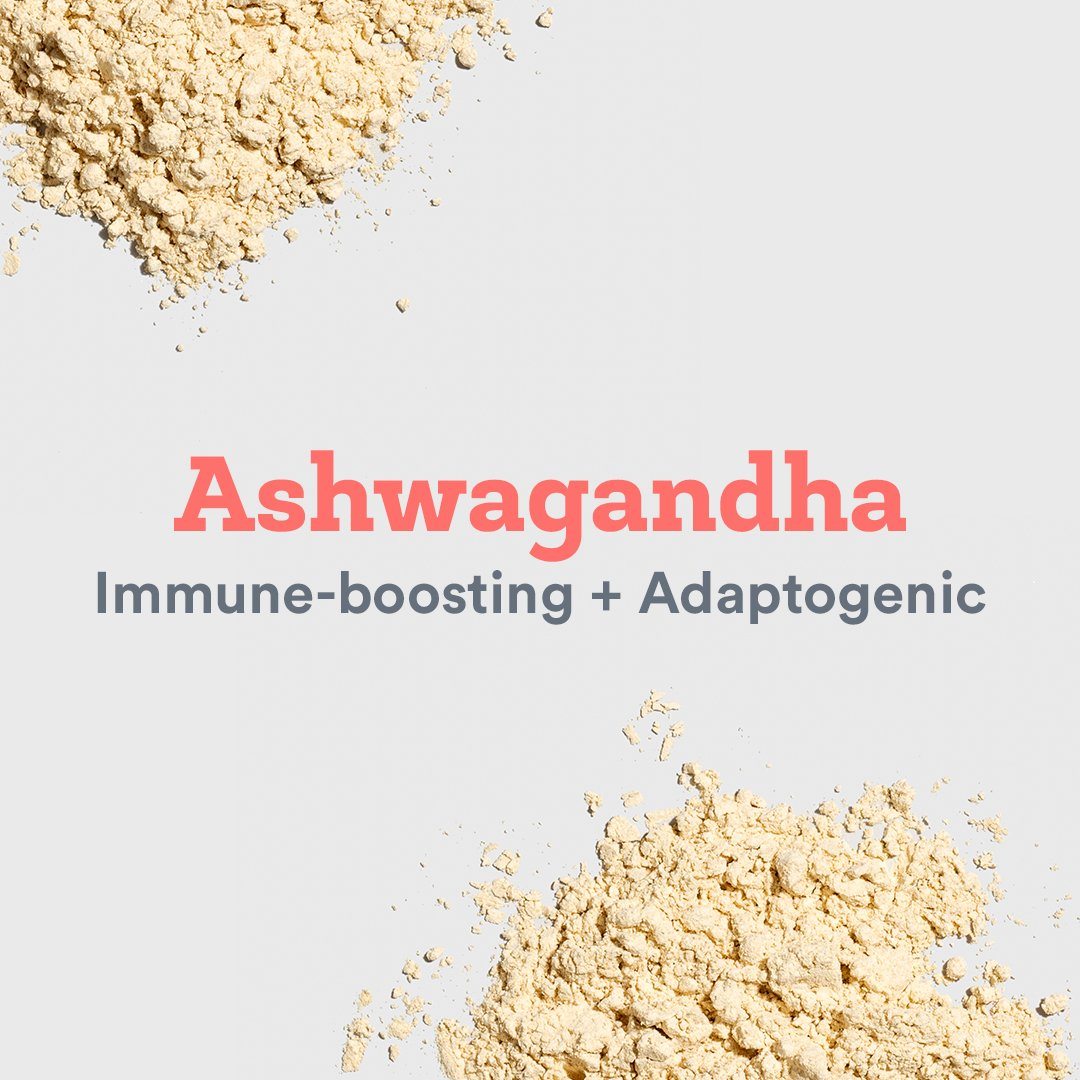
Scientific/Latin name: Withania somnifera
Also known as: Indian Ginseng and Winter Cherry
Native to: India and North Africa
Parts used: Roots and the orange-red fruit
Top benefits: Powerful adaptogen, Anti-Inflammatory and Cognitive, Athletic and Immune support

Ashwagandha, the Rejuvenative Tonic
It’s one of the most powerful and popular adaptogens available. Even though it’s been used in Ayurvedic medicine for thousands of years, it’s making a name for itself in the Western world as a natural remedy for stress and for supporting cognitive function.
As the use of Ashwagandha increases in the West, from integrative medicine to alternative medicine, more healthy adults are becoming familiar with this adaptogen and wonder if it can really have an impact on daily functions as varied as sleep quality and athletic performance.
We’ll explain what it is, cover its benefits, and explain how you can add it to your daily routine.
What Is Ashwagandha?
Ashwagandha is a small, woody evergreen shrub in the nightshade family that is native to Asia and in parts of Africa (it’s most widely cultivated in central and northwestern India). The roots of the shrub are primarily used for medicinal properties. Specifically, extensive research demonstrates that Ashwagandha root extract has the most restorative and adaptogenic properties of any other part of the plant.
History of Use
Ashwagandha is an adaptogenic herb that’s been prized for over 6,000 years in Ayurveda (the ancient Hindu system of medicine), and continues to be used as a household remedy in India.
Ashwagandha is revered in traditional medicine for various actions, including to revitalize, relieve stress, improve endurance and stamina, promote longevity, improve immunity, enhance memory and cognition, reduce inflammation and support sexual function. It’s no wonder Ashwagandha is one of the most important herbs in Ayurveda, a Sanskrit word meaning "the scripture for longevity".
Health benefits of Ashwagandha
If you search #ashwagandha on social media, you’ll probably come across content that shows users who seem to be energized and focused due to the purported effects of Ashwagandha.
Let’s dive into the effects of Ashwagandha on your brain and body and how they can help support your wellness.
Adaptogenic/Stress Support
The body’s natural stress response helps keep us safe from danger by raising levels of stress hormones like adrenaline and cortisol. However, if we are under chronic stress, our cortisol levels continuously rise, and in the longer term, this can lead to diseases and illnesses.
As an adaptogen, Ashwagandha helps enhance the body’s resistance to stress, bringing it back into balance. Ashwagandha is also thought to help nourish and tonify the adrenals, which can further support a healthy stress response.
The Ayurvedic system of medicine claims that Ashwagandha promotes stress relief, health and longevity by enhancing the immune system, restoring balance in the body and increasing resistance to physical, emotional and psychological stressors.
These adaptogenic effects have been evidenced in a number of clinical trials, which demonstrate that standardized Ashwagandha extract safely and effectively reduces both perceived and biochemical indicators of stress.(1, 2) Withanolides are the bioactive compounds considered to be predominantly responsible for the medicinal properties of Ashwagandha.
Ashwagandha is a calming adaptogen, so while other plants may offer similar adaptogenic benefits, Ashwagandha is best suited for those disposed to nervousness or anxiety. Because it helps calm the nervous system, it can also help promote better sleep.
Cognitive support
Ashwagandha is a well known Ayurvedic rasayana (rejuvenative tonic), and belongs to a sub-group of rasayanas known as medhyarasayanas, referring to the mind and mental capacity. It's traditionally used to promote learning and enhance memory, and this historical use is supported by clinical research. A 2017 study showed that Ashwagandha may be effective in enhancing both immediate and general memory, as well as improving executive function, reaction time, attention and information processing speed.
Also revered as a general tonic, Ashwagandha is considered beneficial to the brain and nervous system as a whole. Stress can be damaging to the nervous system, and research shows that Ashwagandha protects against wasting away of nerves and brain cells, which is considered the major cause of cognitive impairment in patients with neurodegenerative diseases, such as Alzheimer's and Parkinson's. In animal studies, it has been shown that withanolides and withanosides are among the key compounds in Ashwagandha responsible for reducing the pathology of Alzheimer’s disease, including reversing behavioral deficits and clearing toxic amino acid chains from the brain. Further, Ashwagandha contains potent antioxidants that fight free radicals and help prevent oxidative damage to the brain.

Athletic support
This strong smelling ayurvedic herb’s Sanskrit name, ashvaganda, literally translates to "odor of the horse". It’s also been appropriately proposed that the Sanskrit name could be interpreted to mean "horse essence", suggesting that it provides the strength and stamina of a horse to those who take it.
Ashwagandha’s history of traditional use for strength and stamina is also clinically supported. Studies show that ashwagandha supplementation is associated with significant increases in muscle mass and strength, enhanced recovery, increased body fat metabolism and cardiorespiratory endurance (including maximal aerobic capacity and time to exhaustion), suggesting that it may be a useful athletic support supplement, particularly in connection with resistance training and endurance training.(1)(2)(3)(4)
Immune support
Ashwagandha is commonly used in Ayurveda to enhance immunity, believed to correct imbalances and weakness in the immune system. It is referred to as a "rasayana", an elixir that works in a nonspecific, global fashion to increase human health and longevity.
Clinical research in human and animal studies supports this traditional practice, showing that Ashwagandha improves the body’s ability to combat disease by increasing white blood cells in the body, the cells of the immune system that are involved in defending against both infectious disease and foreign invaders. Due to its immunomodulating properties, its use has also been suggested for cancer patients, who are at a particularly high risk of lowered immunity.

Anti-inflammatory
Ashwagandha is an anti-inflammatory and anti-arthritic super-herb commonly used in Ayurveda to treat arthritic conditions. A paste made by crushing the roots with water is also traditionally applied externally to reduce inflammation at the joints and treat ulcers and painful swelling.
This herb’s anti-inflammatory potential has been demonstrated in a number of animal studies, as well as human studies on patients with osteoarthritis and knee joint pain. In a recent study, Ashwagandha also helped to alleviate pain and tenderness and swelling of the joints and improve physical function in patients with rheumatoid arthritis.
Withanolides, a key group of active compounds contained in Ashwagandha, have been shown to play a key role in Ashwagandha's anti-inflammatory activity.
We would like to stop and note here that, although Ashwagandha comes with an impressive array of benefits, it’s still important to get medical advice from a healthcare professional before adding a new supplement to your routine. This goes double if you’re pregnant or breastfeeding.
Ashwagandha Everyday
Improved stress support, fewer aches and pains, and more muscle strength? Sure, sign us up. If you’re up for increased energy levels and better mental health, read on to learn how to add Ashwagandha to your daily health stack.
Balance Functional Chocolate
Taking your supplements just got a lot sweeter. Balance Functional Chocolate is the delicious, fudgy, craft chocolate bar that helps you elevate your snack time to mental health break. Along with Ashwagandha, you’ll also get Reishi Mushroom, Cacao, and Cacao Butter: the perfect blend of functional ingredients and nutrition to help you enjoy smooth, stress-free sailing the rest of your day.
At just 180 calories and with no refined sugar, this chocolate bar won’t spike your blood sugar levels and leave you tired or interfere with your weight loss goals.
Ashwagandha Forever
The solution for your stressful life? Maybe it’s therapy, maybe it’s doing less and saying “no” more, or maybe it’s adding in an adaptogen like Ashwagandha.
Ashwagandha helps balance your stress response, support your immune system, enhance your strength and stamina, and improve your cognition, all without giving you unwanted side effects. At JOYÀ, ashwagandha is one of our favorite adaptogens. That’s why you’ll find it in so many of our products.
Getting your ashwagandha is easy with the chef-crafted products available from JOYÀ.
The health research presented in this article is for informational use only. It is not a replacement for professional health advice and should not be construed as a recommendation of specific products. The products sold on this website are not intended to diagnose, treat, cure, or prevent any disease. This information does not provide dosage or format recommendations or possible drug interactions, and accordingly, should be used with the advice of a qualified health care practitioner.

